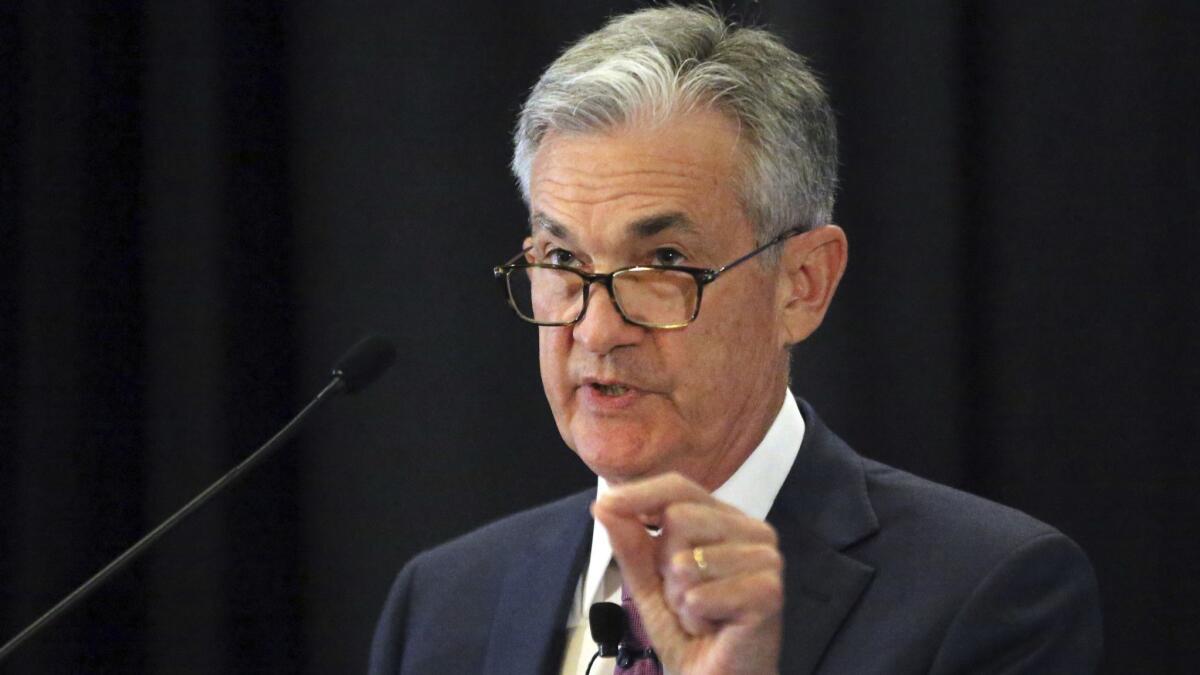As Trump slams Fed, its policymakers are tuning him out — and moving ahead with rate hikes

Reporting from Washington — President Trump has been slamming the Federal Reserve for raising interest rates, but the central bank’s officials appear to be tuning him out.
There was no mention of Trump or his unusual public criticism at the Fed’s Sept. 25-26 monetary policy meeting, according to an official account released Wednesday with the standard three-week delay.
The meeting’s minutes also indicated that Fed officials are undaunted in pushing ahead with more planned hikes in the central bank’s benchmark short-term rate as the U.S. economy strengthens.
The rate hikes are designed to keep the economy from growing too quickly and causing prices to jump sharply, which would cause harmful high inflation.
Fed policymakers voted unanimously at the September meeting to hike the federal funds rate by 0.25 percentage point — the third such hike this year — bringing the target range to between 2% and 2.25%. That level still is historically low.
As for future rate hikes, “participants generally anticipated that further gradual increases in the target range for the federal funds rate would most likely be consistent with a sustained economic expansion, strong labor market conditions, and inflation near 2% over the medium term,” the September minutes said.
The Fed wants annual inflation of about 2% to keep wages growing without causing prices to get out of control.
“A number” of the 16 Fed officials at the meeting even said that they expected the interest rate would need to be temporarily pushed above 3% to keep inflation in check, according to the minutes.
A few of the officials said that recent data indicated the economy was growing more strongly than they had anticipated earlier in the year. Large tax cuts took effect on Jan. 1 and the economy grew at a 4.2% annual rate in the second quarter, the fastest pace since 2014.
Fed policymakers noted that the tax cuts, and increased federal spending, were among the “favorable economic factors,” according to the minutes.
But the officials also said that trade policy — specifically new U.S. tariffs on imported steel and aluminum — was causing uncertainty about the economy’s future prospects.
Still, forecasts from Fed officials at last month’s meeting pointed to another 0.25-percentage-point interest rate hike by the end of the year and three more in 2019.
Lenders use the federal funds rate to determine rates for credit cards, car loans, home equity lines of credit and small-business loans. The rate doesn’t directly affect longer-term interest rates, such as those for home mortgages. But those rates have jumped recently, in part because of the Fed’s moves and upbeat assessment of the economy.
Trump said he isn’t happy about higher interest rates, which could slow economic growth by making it more expensive for businesses and consumers to borrow. Higher long-term rates also increase the interest the U.S. must pay on its fast-growing debt.
Trump began criticizing the Fed in July, saying he was “not thrilled” that it was slowly raising its benchmark rate. He was the first president since 1992 to publicly criticize the Fed, an independent institution whose credibility depends on investors believing it is not influenced by political pressure.
Trump amped up his critique last week, saying the Fed “has gone crazy” and is “going loco” in blaming the interest rate hikes for a steep downturn in major U.S. stock indexes.
Former Fed Chairwoman Janet L. Yellen, who left the job in February after Trump chose not to nominate her for a second four-year term, warned Tuesday that politicizing the central bank “would undermine the confidence that the Fed has a commitment to price stability.”
Later Tuesday, Trump continued to pound on the Fed and his handpicked replacement for Yellen — Jerome H. Powell.
“My biggest threat is the Fed, because the Fed is raising rates too fast, and it’s independent so I don’t speak to him, but I’m not happy with what he’s doing because it’s going too fast,” Trump told Fox Business.
Powell and other Fed officials have not directly addressed Trump’s criticism. Three of the four members of the Fed’s Board of Governors were nominated by Trump, and he said Tuesday that he was “not so happy” with them either.
Asked about the president’s criticism at a news conference after the September meeting, Powell said, “[W]e don’t consider political factors or things like that.”
“We’ve been given a really important job to do on behalf of the American people by Congress and we’ve been given the tools to do it, and my colleagues and I are focused exclusively on carrying out that mission,” he said.
Investors still strongly believe the Fed will raise the rate again in December — the fourth quarter-point hike this year. The odds of a December rate hike were about 80% on Wednesday, according to the FedWatch tool of the CME Group futures exchange. The figure is down slightly from a week ago.
Twitter: @JimPuzzanghera
More to Read
Inside the business of entertainment
The Wide Shot brings you news, analysis and insights on everything from streaming wars to production — and what it all means for the future.
You may occasionally receive promotional content from the Los Angeles Times.











